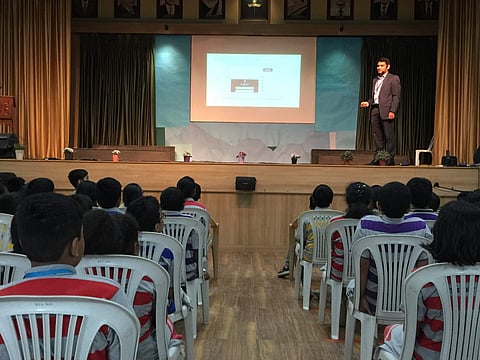

Cyber security is a growing problem, not just for organisations, but also for individuals and even more surprisingly for children. According to a recent report by the Children’s Society in the UK, nearly half (44 percent) the young people spend more than three hours per day on social media, and almost 1 in 10 (9 percent) use social media between midnight and 6 am.
Alarmingly, the same study found that young people who are currently experiencing mental health problems are more than three times likely to have been bullied online in the last year. To make Gen Z aware of the risks that the internet poses, KPMG, an international professional services firm, conducted classroom sessions in schools across the world throughout October, the globally-recognised International Cyber Security Awareness Month.
KPMG has been organising this community event since 2017 and this year in India they held the cyber literacy training for 77,569 students in 178 schools. With the overwhelming number of children they impacted this year, KPMG celebrated its annual Global Cyber Day across 51 countries around the world on November 7. This three-year-old global initiative, led by KPMG cyber security professionals, is aimed at educating young people about the importance of cyber security and internet risk. The classroom sessions, which are completely free of cost for the schools that take part in it, included guidance on safe use of personal data, social media, cyber bullying, online gaming and smartphones.
Explaining how it is essential for children to understand cyber security in this day and age, Akhilesh Tuteja, who co-leads KPMG’s Global Cyber Security practice, said, "Cyber security in today's world has become synonymous to being literate, a lot of people use the internet now for work, for entertainment, and more. Kids actually use digital resources both as part of their studies as well as recreation. In today's world we may find people who do not know how to read and write but know how to use the phone or a computer."
Adding how we sometimes do not weigh the risks on the internet, Akhilesh said, "Technology has made it more foundational for everybody to use digital resources. When you are on the internet or the digital world there are extreme amounts of risks that come your way and most of the time you are not aware of them, you can't spot them unless you are vigilant. Risks vary for different kinds of things — if you are a businessman, you should know how your business can be hacked into. If you are a student then cyber bullying can be an issue. In the real world the bullies don't want to be identified so they resort to the virtual one. Young people need a safety net to help keep bullies at bay."
During the Cyber Security Month, the aim of the sessions were to speak to students in schools on how to be cyber safe. The sessions consisted of the kinds of risks that they might face and is was targeted towards a specific age group of 7-16 years. The children were divided into two groups — 7-11 years and 11-16 years. The divisions were important as the exposure on the internet is different for both the age groups, added Akhilesh. "We focused on six to seven different types of risks — what do you need to do to protect your identity, what do you do about sharing your location, how to setup your smartphone safely, how to play games online safely on the net and more. We also warned them against plagiarism to keep them safe. They were taught about protected content and things like what is copyright and what content cannot be copied from the net and put out as one's own work," explained Akhilesh. He added that a lot of children while working on an assignment they might pick up something from the internet and would not be aware of the copyright infringement part. So, they were also taught how to look for copyright free content, to determine what they can copy and what not.
In 2017, when KPMG turned this into a global initiative, they were awarded a Guinness World Record for hosting the largest number of students for a cyber security class, which was a total of 36,000. Since then they have only grown bigger. This year, the initiative covered 51 countries and 1,26,000 children across the world. In India over 15 cities took part and KPMG cyber security professionals tried to cover as many schools as possible in their respective areas.
